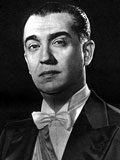Juscelino Kubitschek de Oliveira descended from a family with relations in political circles of Minas Gerais. He was educated as doctor at the Faculty of Medicine of Belo Horizonte receiving his degree in December 1927. Working in a Belo Horizonte hospital, Kubitschek was successful in his second marriage to Sara Gomes de Lemos (30 Dec 1931), a member of Minas Gerais political elite. He won a public recognition rendering medical services to the government troops suppressing the Constitutionalist Revolution in São Paulo (1932) and was nominated (1933) chief of staff in the government of Minas Gerais. In 1934 Kubitschek joined the Progressive Party of Minas Gerais (Partido Progressista de Minas Gerais) and assumed the party secretaryship. He was elected to the federal Chamber of Deputies (1935-1937), dissolved by Getúlio Dorneles Vargas on 10 Nov 1937. Kubitschek returned to his medical practice and became prefect of Belo Horizonte (1940-1945). He was active in organizing the Social Democratic Party (Partido Social Democrático, PSD) (1945), which supported the candidacy of General Eurico Gaspar Dutra at presidential elections of 2 Dec 1945. After his election (2 Dec 1945) to the Constituent Assembly, Kubitschek again was a member of the federal Chamber of Deputies from 1946 to 1950. In 1951 Kubitschek won the election of governor of the State of Minas Gerais, a position he held for the next four years (31 Jan 1951 - 31 Mar 1955), which enabled him to be a favorite of the presidential election on 3 Oct 1955. Elected on a platform of economic reform, Kubitschek favored rapid development of industries and foreign investments. On 30 Sep 1957, he signed a law moving the national capital to a new city, Brasília, which was to be built in the Goiás highlands. This ambitious project required vast amount of money for the rehabilitation of the drought-afflicted northeast region and consumed much of the federal government's financial resources. The government could not stop the inflation worsening with the drop in coffee prices, while the cost of living was rising. Parliamentary elections of 1958 did not bring serious changes in the composition of National Congress dominated by PSD (115 seats). After the new capital was finally inaugurated on 21 Apr 1960, Kubitschek had to return to more orthodox economic policies. When his presidential term expired, Kubitschek was elected to the Senate as a representative of the State of Goiás (1961-1964). He was nominated for president by PSD, but elections scheduled for October 1965 never took place as the military regime seized power in 1964 and forced Kubitschek into exile (1965-1967). He returned to Brazil in 1967, but abandoned the political scene in 1968. He worked for the Bank of Denasa and later took care of his estates in Goiás. Kubitschek died in an automobile crash near the city of Resende. [1] [2] |
| Candidate (party) |
Popular vote (3 Oct 1955) [3] |
| Juscelino Kubitschek de Oliveira (Social Democratic) |
3,077,411 |
| Juarez do Nascimento Fernandes Távora (National Democratic) |
2,610,462 |
| Ademar Pereira de Barros (Social Progress Party) |
2,222,725 |
| Plínio Salgado (Popular Representation Party) |
714,379 |
| blank |
161,852 |
| void |
310,185 |
|

